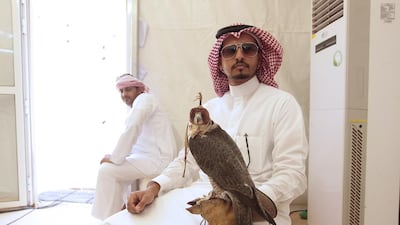DUBAI // In darkness, whispered incantations are meant to focus the falcon’s flight moments before it is unbound from its hooded state.
Having been starved for days before the competition, the bird’s heightened hunting instinct instantly locks on to the man-made prey hundreds of metres away.
Mohammed Al Fadala looks at his falcon, observing its reaction to the sudden appearance of light, but it does not take long for the bird to stretch out and take flight.
“This bird, Al Sayaaf, is as old as my son, 14 years,” said Mr Al Fadala. “I’ve raised him and taken it as my joy to bring him to the bird he is today.”
The relationship between the master and hunter is one that requires patience. Some falconers stay awake for days training a new bird to perch.
But the bond, said Mr Al Fadala – an Emirati who competed at the Fazza Championship for Falconry – is unlike anything else.
“If he gets sick, I get sick,” he said. “My relationship with the birds – this is love, this is friendship, almost a kinship between us. How can I even explain it?”
He said falconry was his hobby, a sport that does as much for him as it does for anyone else with a passion in life.
“It’s steeped in our tradition to become masters of flight through these birds. They are beautiful animals, and competitions allow us to showcase that.”
K M, a Saudi national who drove from Riyadh to Dubai to participate, sat on the sidelines moments before his bird got to show its paces.
“In falcons we find history, we find a sport, a friendship with others who share. And in a place like this, we can all enjoy the sport,” he said.
It takes a lot to make sure the falcons will fly straight and low, a desirable outcome at falconry competitions. Some birds, K M said, require obedience but eventually, they will come to understand the relationship.
“All birds are wild. They remain wild, but it is up to the falconer to bring him closer to the challenge, to make him fly true and fast.”
The hunt in competitions seldom lasts more than 25 seconds but it is an art form that has taken civilisations to perfect.
Historically, the sport practised in the Arabian Gulf has existed wherever falcons were found. It is believed that Kitab Al Mutawakkil, an important treatise on falconry, was obtained and translated by Fredrick II, the Holy Roman Emperor, during the 13th century, and was the first time falconry was introduced to the West.
But the earliest accounts of falconry were recorded in Mesopotamia from 2,000BC when the pastime afforded participants sport and status, and not much has changed since. “I can spend days talking about what it takes, how much it means, to take a bird to this level,” said Fathal Al Mashry, of the Qatari Lebertha team. “This is a lifestyle, not a simple flight.
“As long as we have people supporting it, it will never die as a sport, and we’d like to thank everyone involved in making this passion.”
The festival, run by the Hamdan bin Mohammed Heritage Centre, took place last week.

